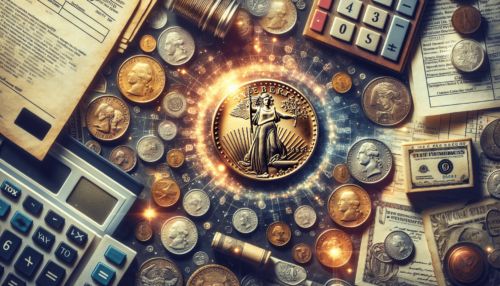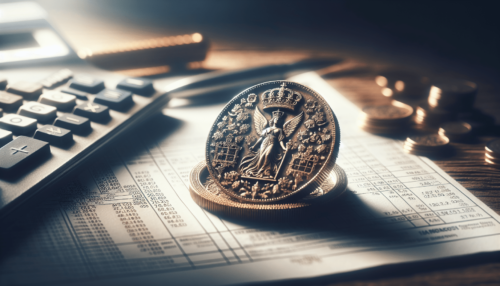“Understanding the Tax Implications of Selling Collectibles” sheds light on the crucial topic of taxes associated with the sale of collectibles. The article provides valuable insights into the fiscal considerations that collectors and hobbyists must be aware of when selling their cherished items. With a focus on clarifying complex tax rules, this article aims to equip readers with the necessary knowledge to navigate the world of collectible sales and help them make informed decisions. By exploring the tax implications of selling collectibles, individuals can ensure compliance with the law and maximize their financial gains while indulging in their favorite hobbies.

Table of Contents
Defining Collectibles from a Tax Perspective
Understanding what constitutes a collectible
When it comes to taxes, it’s important to have a clear understanding of what constitutes a collectible. The Internal Revenue Service (IRS) defines collectibles as tangible personal property that is considered to be of a type commonly collected by the public, such as antiques, artworks, coins, stamps, precious metals, and even certain types of wine.
The Internal Revenue Service’s definition of collectibles
According to the IRS, collectibles are subject to special tax rules and regulations. The agency considers collectibles as capital assets and not ordinary income. This means that when you sell a collectible, any profit you earn from the sale may be subject to capital gains tax.
Examples of common collectibles
Common examples of collectibles include rare stamps, vintage baseball cards, limited edition art prints, antique furniture, and gold or silver coins. These items are often valued for their rarity, historical significance, or aesthetic appeal. It’s important to note that not all personal property can be classified as collectibles for tax purposes, so it’s essential to consult the IRS guidelines or seek professional advice if you’re unsure.
The Importance of Keeping Records for Your Collectibles
Why keep records of purchase
Keeping accurate records of your collectible purchases is crucial for several reasons. Firstly, it helps you establish the cost basis of your collectibles for tax purposes. The cost basis is the original purchase price, including any related expenses such as shipping or appraisal fees. This information is essential when calculating your taxable gain or loss when you sell the collectible.
Secondly, maintaining records can help prove the authenticity and ownership of your collectibles, which may be important for insurance purposes or if you decide to sell or donate the items in the future.
What records should be kept
To ensure compliance with tax regulations, it’s recommended to keep the following records for your collectibles:
-
Purchase receipts or invoices: These documents serve as proof of the purchase price and date.
-
Appraisal reports: If you had your collectibles appraised for their value, it’s essential to retain appraisal reports issued by qualified professionals.
-
Documentation of related expenses: Keep records of any expenses incurred for transportation, insurance, storage, maintenance, or restoration of the collectibles, as these may be considered when determining the cost basis.
-
Proof of ownership: Maintain any documentation that establishes your ownership of the collectibles, such as certificates of authenticity or transfer of ownership documents.
How these records affect your tax declaration
Keeping comprehensive records of your collectibles can streamline the process of reporting your tax obligations accurately. When it comes to selling a collectible, you’ll need to determine your taxable gain or loss. By having well-organized records, you can easily calculate the difference between the sales price and the cost basis, ultimately determining the amount subject to capital gains tax.
Moreover, in the event of an IRS audit, having proper documentation to support your claims will help substantiate your tax positions and potentially avoid penalties or disputes.
Understanding the Tax Implications of Selling Collectibles
Understanding Capital Gains Tax
Explanation of capital gains tax
Capital gains tax is a tax imposed on the profits gained from the sale of capital assets, including collectibles. When you sell a collectible for more than its cost basis, you realize a capital gain. The capital gains tax is levied on this gain to ensure that individuals pay their fair share of taxes on the profit earned from selling assets.
Short-term vs long-term capital gains
In the United States, capital gains are classified as either short-term or long-term based on the holding period of the asset. If you hold a collectible for one year or less before selling it, the resulting gain is considered a short-term capital gain. If you hold the collectible for more than one year, it’s classified as a long-term capital gain.
Capital gains tax rates
The tax rates for capital gains can vary depending on your income level and the type of asset being sold. For collectibles, the tax rates are generally higher compared to other capital assets. Currently, the maximum long-term capital gains tax rate for collectibles is 28%, while the short-term capital gains tax rate aligns with your ordinary income tax rate.
It’s important to consult with a tax professional or refer to the IRS guidelines to ensure you understand the specific tax rates and thresholds that apply to your situation.
How Capital Gains Tax Applies to Collectibles
Special tax rates for collectibles
As mentioned earlier, collectibles are subject to special tax rates when it comes to capital gains. Regardless of your income level, the maximum tax rate for collectibles is capped at 28%. This is significantly higher than the maximum tax rate for other capital assets, such as stocks or real estate.
Calculating your taxable gain
To calculate your taxable gain from the sale of a collectible, you need to determine the difference between the net selling price and the cost basis. The net selling price is the actual amount you receive from the sale after deducting any expenses incurred, such as commissions or advertising fees.
By subtracting the cost basis from the net selling price, you arrive at the taxable gain. This gain is then subject to the applicable capital gains tax rate.
Potential deductions to reduce your tax burden
While the tax rates for collectibles may be higher, there are still ways to mitigate your tax burden. It’s essential to explore potential deductions that may be available to you. For example, if you incurred expenses related to the sale, such as professional appraisal fees or marketing costs, these expenses may be deductible and can help offset your taxable gain.
Additionally, if you had a loss from the sale of a collectible, you may be able to deduct this loss against other capital gains, potentially reducing your overall tax liability.
Consulting with a tax professional who specializes in collectibles can help identify all available deductions and ensure you’re maximizing your tax benefits.

Selling Collectibles as a Business vs a Hobby
Differences in tax regulations based on selling frequency
The IRS distinguishes between individuals who sell collectibles as a business and those who engage in occasional sales or treat it as a hobby. If your primary intent is to make a profit from selling collectibles, you may be classified as a business. In this case, you’ll need to report your income and expenses on Schedule C of your tax return.
However, if you sell collectibles sporadically or as a hobby, the income generated is generally reported as “Other Income” on your tax return. It’s important to note that even hobby income is generally taxable, but you may have limitations on the deductions you can claim.
Understanding hobby loss rules
If your collectible-selling activities are considered a hobby, you’ll need to be aware of the hobby loss rules. These rules limit the deductions you can claim from your hobby-related expenses. Generally, you can only deduct expenses up to the amount of income generated from the hobby.
It’s crucial to maintain accurate records of your hobby-related expenses and consult with a tax professional to ensure compliance with these rules and optimize your tax situation.
Self-employment tax considerations
When selling collectibles as a business, you may also be subject to self-employment tax. Self-employment tax covers Social Security and Medicare taxes for individuals who are self-employed or operate a business. The current self-employment tax rate is 15.3%, which is comprised of the Social Security tax rate of 12.4% and the Medicare tax rate of 2.9%.
Consulting with a tax professional can help ensure you understand your obligations regarding self-employment tax and strategies to minimize its impact on your collectible-selling business.
Collectibles and the Estate Tax
Understanding how estate taxes apply to collectibles
When it comes to estate planning and passing on collectibles to your heirs, it’s important to be aware of how estate taxes may apply. The estate tax is a tax imposed on the transfer of wealth from a deceased individual’s estate to their beneficiaries. Collectibles held within the estate are included in the total value of the estate and may be subject to estate tax.
Valuation of collectibles for estate tax purposes
To determine the estate tax liability, the IRS requires an accurate valuation of the collectibles held within the estate. The valuation is typically determined based on the fair market value (FMV) of the collectibles on the date of the individual’s passing. The FMV is the price that the collectibles would sell for on the open market between a willing buyer and a willing seller.
Appraisals from qualified professionals are often necessary to establish the FMV of valuable or rare collectibles. It’s crucial to maintain thorough records of these appraisals and consult with an estate planning attorney or tax professional to navigate the complexities of estate tax and minimize the impact on your collectibles.
Strategies to minimize estate tax on collectibles
There are various strategies you can employ to minimize the estate tax liability on your collectibles. One popular approach is to establish a qualified personal residence trust (QPRT), which allows you to transfer your collectibles, including your personal residence, to beneficiaries while reducing the estate’s taxable value.
Another effective strategy is to make lifetime gifts of collectibles, leveraging the annual gift tax exclusion and lifetime estate tax exemption. By gifting collectibles during your lifetime, you can potentially reduce the taxable value of your estate while sharing the joy of your collectibles with loved ones.
It’s important to work closely with an experienced estate planning professional to structure these strategies effectively and ensure they align with your specific goals and circumstances.

Gift Tax and Its Relation to Collectibles
Understanding gift tax
Gift tax is a tax imposed on the transfer of property or assets from one person to another without adequate consideration or compensation. When it comes to collectibles, giving them as gifts may trigger gift tax implications, depending on the value of the collectibles and the relationship between the donor and recipient.
When does gift tax apply to collectibles
Gift tax applies when the value of the collectibles gifted exceeds the annual gift tax exclusion threshold. The annual gift tax exclusion allows individuals to gift up to a specified dollar amount to each recipient each year without incurring gift tax. The exclusion amount is subject to change, so it’s essential to consult the IRS guidelines or a tax professional for the most up-to-date information.
If the value of the collectible gift exceeds the annual gift tax exclusion, the donor may be required to file a gift tax return and potentially pay gift tax. It’s crucial to consider the gift tax implications when transferring collectibles to ensure compliance with tax regulations.
Strategies to minimize gift tax on collectibles
To minimize gift tax on collectibles, there are a few strategies you can consider. One option is to leverage the annual gift tax exclusion by gifting collectibles within the exclusion limit to multiple recipients. By spreading the gifts across different individuals, you can avoid exceeding the exclusion threshold and potentially reduce your gift tax liability.
Another strategy is to make use of the lifetime estate and gift tax exemption, which allows you to gift larger amounts during your lifetime. However, it’s important to note that utilizing the lifetime exemption will reduce the available exemption for estate tax purposes.
To determine the most advantageous approach for gifting collectibles while minimizing gift tax, consult with a tax professional who can assess your specific circumstances and provide tailored advice.
How to Determine the Fair Market Value of Your Collectibles
Methods for appraising collectibles
Appraising collectibles is essential for determining their fair market value (FMV) for tax purposes. The FMV is the price that the collectibles would sell for on the open market between a willing buyer and a willing seller. There are several methods commonly used to appraise collectibles:
-
Comparable sales method: This method involves researching recent sales of similar collectibles to determine their market value.
-
Cost approach method: This method assesses the value of the collectible based on the cost to reproduce or replace it.
-
Income approach method: This method calculates the value of the collectible based on its income-generating potential, such as rental income or royalties.
Engaging the services of a qualified appraiser who specializes in the type of collectibles you own is recommended. A professional appraiser will have the expertise and knowledge to accurately assess the value of your collectibles and provide you with an appraisal report that can be used for tax purposes.
When to seek a professional appraisal
While not every collectible requires a professional appraisal, certain situations warrant seeking the expertise of a qualified appraiser. It’s recommended to consider obtaining a professional appraisal when:
-
The value of the collectible exceeds a significant threshold, such as $5,000 or $10,000, depending on IRS guidelines.
-
The collectible is unique, rare, or difficult to value due to its nature or market volatility.
-
You require an appraisal for estate planning, insurance coverage, or tax reporting purposes.
By obtaining a professional appraisal, you can have confidence in the accuracy of the valuation, ensuring compliance with tax regulations and supporting any tax positions you take related to your collectibles.
Documenting the appraisal for tax purposes
When using a professional appraisal for tax purposes, it’s essential to maintain proper documentation. The appraisal report should include detailed information about the collectible, its condition, any unique characteristics, and the methodology used to determine its value.
This appraisal report will serve as a vital supporting document if the IRS questions the value declared on your tax return or in the event of an audit.
Ensure you retain copies of the appraisal report, along with any related documentation, in a secure location, as these records may be required for several years after the tax year in question.

Common Tax Mistakes when Selling Collectibles
Not reporting the sale on your taxes
One common mistake collectors make is failing to report the sale of a collectible on their tax return. Whether it’s due to misunderstanding the tax regulations or simply overlooking the requirement, not reporting the sale can lead to penalties and potential legal issues down the line.
It’s important to understand that even if the collectible was sold at a loss, you are still required to report the transaction on your tax return. By accurately reporting your collectible sales, you can ensure compliance with tax regulations and prevent unnecessary trouble with the IRS.
Underestimating the value of your collectibles
Another pitfall to avoid when selling collectibles is underestimating their value. Especially for rare or highly sought-after items, the market value may have significantly appreciated since the time of purchase.
Underestimating the value of your collectibles can result in inaccurate reporting of your taxable gain or loss when you sell the item. This can lead to potential discrepancies between the information reported on your tax return and the actual market value, potentially triggering an audit or penalties from the IRS.
To avoid this mistake, it’s crucial to stay informed about current market trends and seek professional appraisals to accurately assess the value of your collectibles.
Not keeping appropriate records
Maintaining comprehensive records is vital for accurate tax reporting and minimizing potential disputes with the IRS. Failing to keep proper records of your collectible purchases, sales, and related expenses can lead to inaccuracies when calculating your taxable gain or loss.
It’s crucial to retain all relevant documentation, including purchase receipts, invoices, appraisal reports, and records of any expenses incurred. These records serve as evidence to support the cost basis, valuation, and legitimacy of your collectible transactions.
By establishing good record-keeping habits from the outset, you can avoid potential pitfalls, ensure compliance with tax regulations, and have peace of mind knowing that you can substantiate your tax positions if required.
Considerations Before Selling Your Collectibles
Analyzing the financial implications
Before deciding to sell your collectibles, it’s important to analyze the financial implications. Consider factors such as the current market value of your collectibles, any potential tax obligations, and the overall impact on your financial portfolio.
If you anticipate a significant profit from the sale, it’s crucial to evaluate the associated capital gains tax and plan accordingly. Additionally, consider how the sale may affect your overall financial goals and whether the funds generated can be utilized more effectively in other investments or financial endeavors.
Strategizing for minimal tax impact
To minimize the tax impact of selling your collectibles, it’s advisable to strategize ahead of time. Review the different tax regulations and rates applicable to collectibles, and explore opportunities for deductions or tax advantages.
Consider consulting with a tax professional who specializes in collectibles to develop a tax-efficient strategy tailored to your specific circumstances. They can help you navigate the complexities of tax regulations, identify potential deductions, and structure the sale in a way that minimizes your tax liability.
Seeking reliable advice on your collectible sales
When it comes to selling collectibles, it’s important to seek reliable advice from professionals who specialize in the field. Consulting with a tax professional, an estate planning attorney, or a qualified appraiser can provide the guidance and expertise necessary to make informed decisions about your collectible sales.
These professionals can ensure that you’re aware of all the tax implications, potential deductions, and strategies available to optimize your financial situation. In addition, they can help you navigate any legal requirements, such as obtaining appraisals or ensuring compliance with gift or estate tax rules.
By leveraging the knowledge and experience of trusted professionals, you can approach your collectible sales with confidence and maximize your financial outcomes.
In conclusion, understanding the tax implications of selling collectibles is crucial for any collector or investor. By familiarizing yourself with the definitions and regulations surrounding collectibles from a tax perspective, you can ensure compliance, minimize your tax liability, and make informed financial decisions.
Remember to keep thorough records of your collectibles, consult with professionals when needed, and stay up-to-date with the ever-changing tax laws. Whether you’re selling collectibles as a business or a hobby, proactive tax planning and accurate reporting will help you navigate the tax landscape smoothly and protect your financial interests.

Related site – Do you need to report your crypto to the IRS next week?

